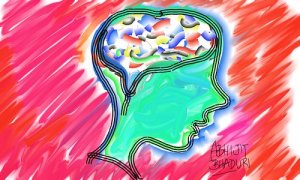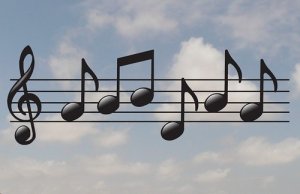What is Alzheimer's Disease? Who Does it Effect?
 By: Abhijit Bhaduri
By: Abhijit Bhaduri
According to the CDC, it is estimated that 5 million Americans had been diagnosed with Alzheimer’s Disease in 2014. It is one of the top 10 leading causes of death in the United States. People aged 65+ are more commonly diagnosed but people as young as 40 have been diagnosed. Alzheimer’s Disease is the most common form of Dementia. It is a progressive disease that onsets with mild memory loss that can lead to more severe symptoms of loss such as the ability to respond to the environment around you and the loss of communication ability. It affects the parts of the brain that control language, memory, and thoughts. This can lead to the decline of a person being able to perform normal everyday tasks and activities. It is projected that by the year 2060, the number of Americans diagnosed with Alzheimer’s Disease will triple to an estimation of 14 million (CDC, 2020).
Is There a Cure for Alzheimer's Disease? What Are the Medical Treatments? What Are the Symptoms?
According to the CDC, there is currently no cure for Alzheimer’s Disease but scientists are currently working to find one and learn more about it. Not much is know about how people develop Alzheimer’s Disease but scientists are researching to find if there are any links to:
- Older Age
- Family History
- Heart Disease, Stroke or High Cholesterol
- Education
- Environment, and more other factors
Medical Treatment for Alzheimer’s Disease is centered around improving quality of life through professional medical management. Again, it is important to note that there is no known cure. Medical treatment through the use of medication seeks to help in the areas of:
- Managing and decreasing a wide variety of behavioral symptoms
- Slowing the progression of the disease
- Maintaining mental function
- Maintaining physical function
Symptoms of Alzheimer’s Disease include:
- Memory decline
- Depression
- Behavioral outbursts of agitation
- Increased irritability
- Wandering
- Changes in personality & mood (CDC, 2020).
What is Music Therapy?
According to the American Music Therapy Association, “Music Therapy is the clinical and evidence-based use of music interventions to accomplish individualized goals within a therapeutic relationship by a credentialed professional who has completed an approved music therapy program. Music Therapy is an established health profession in which music is used within a therapeutic relationship to address physical, emotional, cognitive, and social needs of individuals. After assessing the strengths and needs of each client, the qualified music therapist provides the indicated treatment including creating, singing, moving to, and/or listening to music. Through musical involvement in the therapeutic context, clients’ abilities are strengthened and transferred to other areas of their lives.” (AMTA, 2021).
Has Music Therapy Been Proven To Be Effective in Decreasing the Symptoms of Alzheimer's Disease?

By: photosteve101
Within the past 20 years there has been an increase of interest in the effects non-pharmacological treatments with those for Alzheimer’s Disease. One of the therapies been researched is Music Therapy. Throughout many studies, it is consistently reported that Music Therapy decreased many of the symptoms experienced by those with Alzheimer’s Disease.
According to a study done in 2006 on the effects of Music Therapy on the agitation levels of people diagnosed with Alzheimer’s Disease, the results supported the use of Music Therapy and did decrease levels of agitation, with short-term effect, for those that participated (Baker & Ledger, 2006).
An additional study done in 2018 showed positive results in decreasing depression symptoms and improvement in overall well-being in nursing home residents diagnosed with Alzheimer’s Disease. Depression is one of the most common symptoms of this disease. The study found that Music Therapy with singing and physical movement indicated positive self-esteem, reduced aggression, reduced depression, reduced fall risk, and helped maintain physical motor skills (Gotell & Ray, 2018).
A third study also indicated support of the use of Music Therapy with older adults diagnosed with Alzheimer’s Disease. The study reported that levels of irritability, depression and anxiety decreased in the patients that participated. The study also reported enhanced daily functioning, social participation, physical abilities, and overall quality-of-life (Parent, 2013).
With so much research to indicate positive results supporting the use of Music Therapy with those diagnosed with Alzheimer’s Disease, it is a wonder as to why it is not being implemented more. It is a less expensive, non-pharmacological way to help these people yet it is not widely used. With so much research available, caregivers and family members should advocate for their loved one with Alzheimer’s Disease to participate in Music Therapy.
REFERENCES
ABC Science. (Director). (2016, June 7). Power Of Music On The Brain | Dementia & Parkinson’s [Video file]. Retrieved February 13, 2021, from https://www.youtube.com/watch?v=rnUSNbqtVJI&t=841s
CBS Evening News. (Producer). (2017, August 17). Using music to help unlock Alzheimer’s patients’ memories [Video file]. Retrieved February 13, 2021, from https://www.youtube.com/watch?v=G7vkKHYosuQ
Lakeview Ranch. (Director). (2011, February 22). Memory Moments – Music Therapy [Video file]. Retrieved February 13, 2021, from https://www.youtube.com/watch?v=5SC_G_ZxoRk&feature=emb_logo
Ledger AJ, & Baker FA. (2007). An investigation of long-term effects of group music therapy on agitation levels of people with Alzheimer’s disease. Aging & Mental Health, 11(3), 330–338. https://doi.org/10.1080/13607860600963406
Parent, K. (2013). Use of Music Therapy for Older Adults with Alzheimer’s Disease. Perspectives: The Journal of the Gerontological Nursing Association, 36(2), 18–20.
Ray, K. D., & Götell, E. (2018). The Use of Music and Music Therapy in Ameliorating Depression Symptoms and Improving Well-Being in Nursing Home Residents With Dementia. Frontiers in Medicine, 5, 287. https://doi.org/10.3389/fmed.2018.00287

I really enjoyed reading this blog! The topic was very interesting about the correlation of Alzheimer’s disease and music therapy. Working in a skilled nursing facility, I’ve experienced firsthand how music can have a positive effect on patients with Alzheimer’s. They can be very confused and distraught but after putting on a song from their generation, they tend to calm down and they’ll actually sing all the words. Some facilities I’ve worked at even have a music therapist come in everyday.
I thought this blog was put together in an organized manner and written in a language that was directed at a general audience. It was easy to read and flowed nicely. The blog provided a simple clear background of what Alzheimer’s disease is for the readers who may be unfamiliar. The clips also directly related to the content of the blog and were very interesting to watch. I also liked how you referred back to the research articles for the sources of information. It allows the reader to feel secure knowing the information is coming from a credible source.
Overall this blog was interesting to read and was put together very well. The visuals and clips were effective as it related to the content and it contained a lot of useful and educational information.
This blog really hits home with me. My maternal grandmother suffered from and eventually passed away from Alzheimer’s Disease. Unfortunately, I am now watching my mother’s memory decline from what we believe is the early stages of the disease. Watching someone suffer from Alzheimer’s is heart wrenching. They become a shell of the person you knew and loved. Their mind just can not function normally, as it progresses, memory loss worsens, along with other cognitive difficulties. Caregivers worry about wandering and their loved one getting lost, trouble handling money or paying bills, trouble completing daily tasks, and personality and behavior changes. As Alzheimer’s progresses, it is likely of dying from pneumonia, because the loss of the ability to swallow means that food and beverages can enter the lungs and cause infection.
Your blog introducing the therapeutic components of music is very comforting. I see music make a difference with my mom as it did my nana. With such a horrible disease, it is so important to find resources that help.